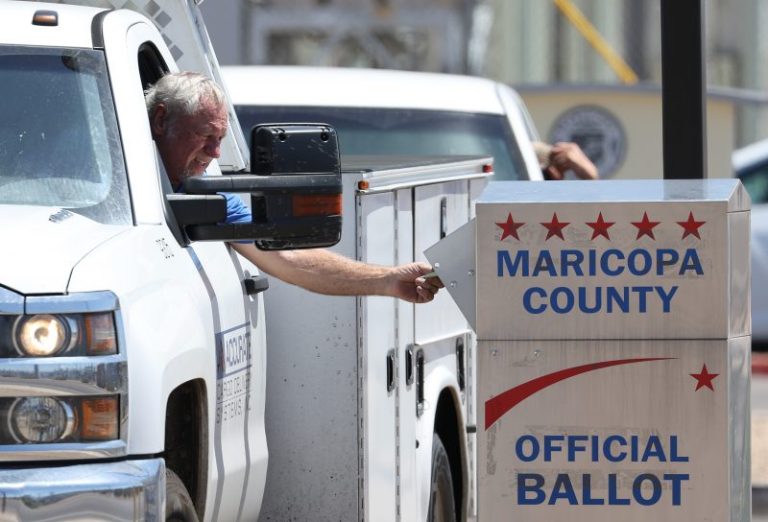An Arizona group that monitored ballot drop boxes for signs of fraud during the midterm elections has settled a lawsuit and agreed to “publicly condemn intimidation of any kind in connection with the exercise of the right to vote,” according to a statement Sunday from the League of Women Voters of Arizona, which had filed the suit.
The group last October sued Clean Elections USA and its founder, Melody Jennings, alleging the tactics of the group and its allies amounted to illegal voter intimidation.
The drop boxes, intended to provide a secure, convenient place to submit ballots, have become a symbol of mistrust in elections among many supporters of former president Donald Trump.
Trump and his allies nationally and in Arizona have urged supporters to monitor outdoor drop boxes, an outgrowth of the discredited film “2000 Mules” that asserted that drop boxes were stuffed with fraudulent ballots during the 2020 presidential election.
During the 2022 midterms, various activists monitored ballot drop boxes and filmed people voting as they claimed to look for signs of fraud.
“This litigation has been essential to protect the voters of Arizona, who have the right to cast their ballots free from intimidation, threats or coercion,” Pinny Sheoran, president of the League of Women Voters of Arizona, said in the group’s statement.
Alexander Kolodin, an attorney for Clean Elections USA and Jennings, said Sunday by phone that “both sides value and wish to protect freedom of speech and the right to free assembly while also condemning any sort of voter intimidation.”
The settlement comes after a federal judge in November issued a temporary restraining order, directing those working with Clean Elections USA to stay at least 75 feet away from ballot drop boxes and correct false statements they’ve made about Arizona election law. The ruling, by U.S. District Judge Michael Liburdi, also prevented activists from photographing or videotaping voters to spread untrue allegations of electoral fraud.
Clean Elections USA agreed to parts of the order but contested other aspects, such as the 75-foot limit on filming, which Kolodin described at the time as a “huge First Amendment problem,” according to the Arizona Republic.
Ballot drop boxes are locked containers where voters can deposit ballots rather than mailing them in. They have been one focus of Trump’s baseless claims of voter fraud, and voting rights activists worry drop-box watchers could continue to intimidate voters in coming elections, especially the 2024 presidential election.
The Justice Department filed a “statement of interest” in the case in October, arguing that “vigilante ballot security measures” probably violated the federal Voting Rights Act. The case unfolded in the run-up to last year’s midterm elections and was the first time in the election cycle that Justice entered an ongoing lawsuit involving ballot drop boxes.
“When private citizens form ‘ballot security forces’ and attempt to take over the State’s legitimate role of overseeing and policing elections, the risk of voter intimidation — and violating federal law — is significant,” the department said in the filing.

